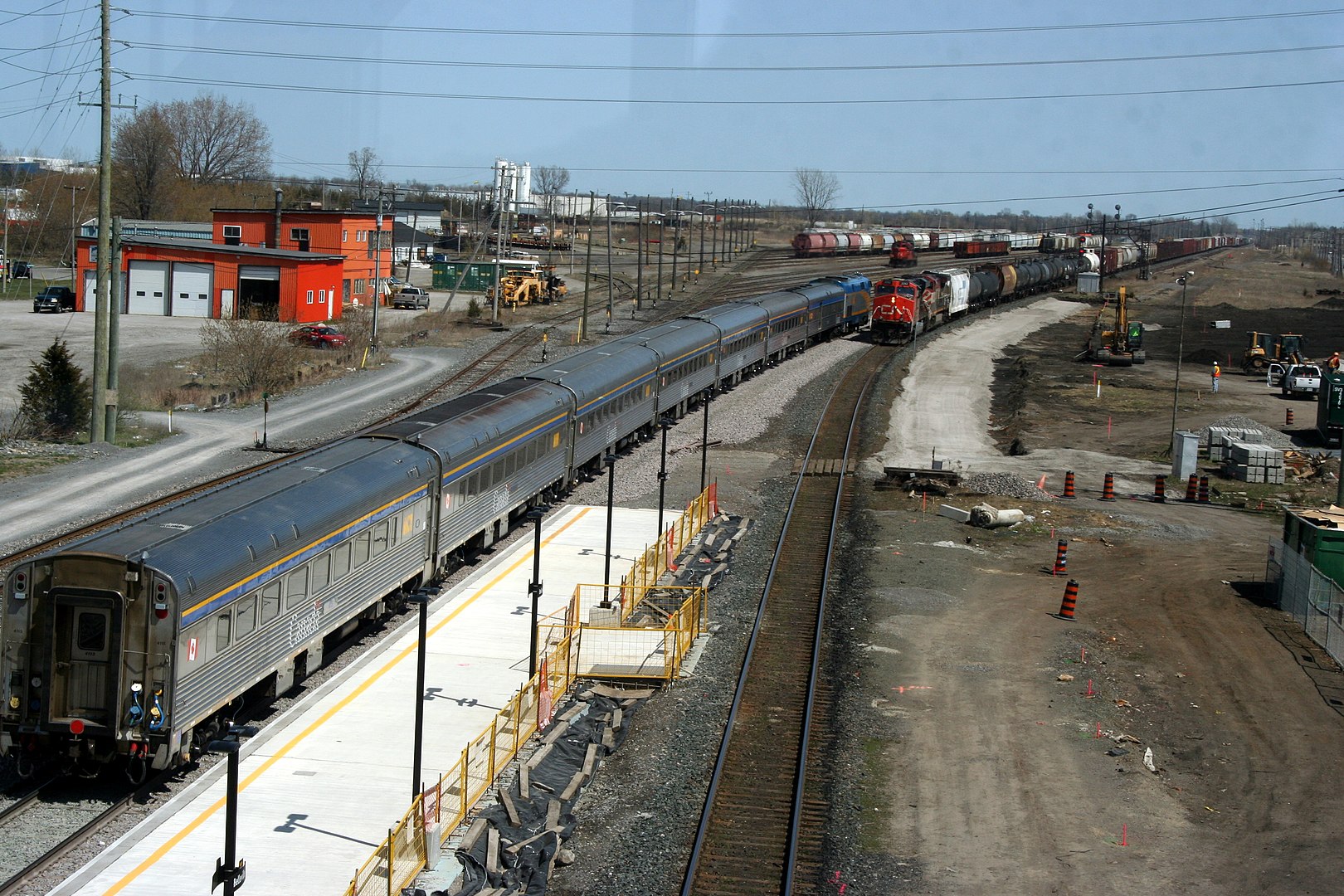Canada News
Industry warns of empty shelves as CN rail blockade reaches ninth day

FILE: Train 60 departs Belleville for Ottawa and Montréal passing incoming CN freight (Photo by Robert Taylor from Stirling, ON, Canada – VIA Rail Train 60_6355, CC BY 2.0)
MONTREAL — Sectors from retail to oil and gas are calling on governments to resolve a dispute with anti-pipeline protesters as a rail blockade enters its ninth day, extending railway shutdowns and threatening shortages of groceries, propane, drinking water and other goods.
Demonstrators set up a blockade near Belleville, Ont., on Feb. 6 after RCMP officers enforced an injunction against opponents of the Coastal GasLink pipeline project that crosses the traditional territory of the Wet’suwet’en First Nation in northwestern B.C.
Fresh food, personal hygiene products and baby formula are among the goods that could soon run out as halted railcars in the eastern half of the country clog CN’s network from coast to coast.
“It’s not like there’s 10,000 idled trucks sitting in some subterranean basement somewhere that can just be dusted off if there’s a rail stoppage. There’s just too much volume for that,” said Retail Council of Canada spokesman Karl Littler.
Canadian Propane Association CEO Nathalie St-Pierre says wholesalers in the Maritimes have already begun to ration distribution while truck line-ups for the fuel in Sarnia, Ont., are now up to 10 hours long as water treatment plants, hospitals, farmers and rural residents await more shipments.
Drinking water could also fall into short supply if chlorine for water treatment stays off the tracks, according to chemical distribution trade group Responsible Distribution Canada.
“If something doesn’t happen now, we’re going to start seeing municipalities in Ontario beginning to have boil-water advisories going out,” said president Cathy Campbell.
“This week it’s going to get very scary.”
Hand sanitizer, de-icing fluid for aircraft and chemicals used to coat cars and clean food processing equipment could prompt production line shutdowns, she said.
Industries from manufacturing to fertilizer say they respect the right to peaceful protest but argue it’s time for federal and provincial governments to bridge the impasse or enforce injunctions obtained by CN.
“We do feel like we’re sort of getting sideswiped by a protest that pertains more to natural resources products than rail,” said the retail council’s Karl Littler.
Via Rail has cancelled all service on CN tracks in Canada, leaving only two northern routes open — between Sudbury and White River in Ontario and between Churchill and The Pas in Manitoba.
Prime Minister Justin Trudeau said Friday he has no plans to order the RCMP to end blockades of vital rail links across the country.
“We are not the kind of country where politicians get to tell the police what to do in operational matters,” Trudeau said Friday in Munich, where he was attending a global security conference.
That message stood in contrast to one from Conservative Leader Andrew Scheer, who earlier Friday called on Trudeau to order Public Safety Minister Bill Blair to use his authority under the RCMP Act to end what he called the “illegal blockades” by Indigenous Peoples at the centre of a dispute over a British Columbia pipeline project.
Early Friday morning, demonstrators lifted a rail blockade that was set up four days earlier on the line into Prince Rupert, re-opening a key port.
First Nations leaders had suggested that would happen if federal and provincial politicians agreed to meet to discuss solutions to the ongoing dispute over construction of a natural gas pipeline through Wet’suwet’en traditional land.
The ongoing eastern network shutdown impedes mills’ ability to ship pulp, two-by-fours and wood panelling to the U.S. and beyond, said Forest Products Association of Canada CEO Derek Nighbor, who called the CN line a “critical artery.”
“For every train car that we use for pulp, it would take four trucks to move that same carload. For lumber it’s two trucks for every one train car,” Nighbor said.
“You’re now having mills that are having a hard time, getting close to not being able to run because they can’t get the chemicals or the fuel in,” he added. “That’s expensive — warehousing and storage, finding trucks.”
Canadian Federation of Agriculture president Mary Robinson says the backed-up rail lines are hampering producers’ ability to export commodities, warning of “huge financial consequences” as farmers do not get paid until products get to market.
“Rail service disruptions can also have negative impacts on animal welfare issues, as propane shipments are crucial to keeping barns heated during the winter months,” she said.
While the repercussions of the rail shutdown are negative for the vast majority of stakeholders, the closure of Via’s Ottawa-Toronto and Montreal-Toronto routes has proven to be a bonus for Porter Airlines, which said more passengers have booked flights between those cities over the past week as a result.





















